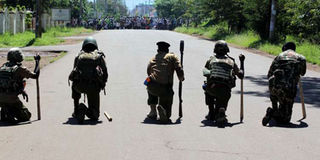Court directs govt to demarcate demonstration zones

Anti-riot police officers get ready to repulse Cord supporters demonstrating against the IEBC in Kisumu town on May 9, 2016. PHOTO | FILE | NATION MEDIA GROUP
What you need to know:
- There should be a clear line of responsibility of who is liable in case of loss to life or property, or for injury.
State to create rules prescribing responsibilities for clean-up costs.
Police are duty bound to stop armed protestors.
The government has been directed to demarcate demonstration zones to ensure rights and freedoms of non-demonstrators are neither suspended nor interfered with.
The court also directed the government to formulate regulations prescribing responsibilities for clean-up costs, maximum numbers (of demonstrators) and consents of persons or entities adjacent to demonstration zones.
PENALTIES
The regulations should also provide appropriate penalties for demonstrators when they go outside the expectations of the law.
In orders directed to Ministry of Interior Cabinet Secretary Fred Matiang’i, Inspector General of Police Hillary Mutyambai and Attorney General Kihara Kariuki, Justice James Makau also ordered the formulation of a Code of Conduct for convenors of demonstrations.
According to the orders in the landmark ruling, convenors of a demonstration will be expected to provide a detailed explanation on how they intend to ensure non-demonstrators are not adversely affected during demos.
Also, there should be a clear line of responsibility of who is liable in case of loss to life or property, or for injury, when a member of the public is aggrieved due to such demonstration.
The judge declared that during protests, the non-demonstrators also enjoy equal rights and freedoms since their rights and fundamental freedoms are not suspended during such times.
While ruling on a petition filed by Mr Ngunjiri Wambugu, now Nyeri Town MP, challenging ant-IEBC protests organised by the Coalition for Reforms and Democracy (CORD) in 2016, the judge found that right to picket is conditional.
CONSTITUTION
“The fundamental right under Article 37 of the Constitution of Kenya to assemble, to demonstrate, to picket and to present Petitions to public Authorities is conditional on the protestors or demonstrators conducting themselves peaceably and unarmed,” stated Justice Makau.
He ruled that police and other security agencies are duty bound to immediately stop protestors or demonstrators if they are armed with any form of weapons including stones or any offensive weapon of whatever nature.
In the petition Mr Wambugu gave detailed account of the nature of violation of the rights and freedoms that took place during the public demonstration, organised by CORD to force the ouster of commissioners of the IEBC.
The demonstrations were carried out weekly from April 25, 2016 for four weeks.
In the entire period of the demonstrations, the court heard, ordinary businesses were interrupted and most premises closed, businesses looted, roads blocked to curtail movement, people harassed by the demonstrators, public service vehicles burnt, public and private property destroyed.
The petitioner said the respondents (Ministry of Interior, Inspector General of Police and the Attorney General) failed to enforce the Public Order Act.
DEMONSTRATIONS
Judge Makau stated it was telling that in the said demonstrations there were no arrests made and charges preferred on the demonstrators that perpetrated the said acts of violence, destruction or carrying of offensive weapons.
“Based on the fact that CORD demonstrators set a precedent, in further exercise of the freedom of assembly, there will still be no regard for the rights of non-demonstrators and their rights to equal protection of the law will be violated,” the petitioner had told the court.
Justice Makau said according to how demonstrations are organised and conducted in the country, the petitioner’s apprehension was reasonably justified as violations are likely to be caused by rival group sought and organised without prior notice and participate in counter demonstration.
Notwithstanding the empowerment bestowed on Interior Ministry to make regulations regarding demonstration, picketing or petition, it failed to develop any meaningful regulations to give full effect to the provisions of the public order Act.
Such a move would otherwise protect or prevent violation of non-demonstrators’ rights and also hold the organizers accountable or make them more responsible for any destruction of property or violence.
PREJUDICE
“Rights can only be enjoyed to the extent that they do not interfere with other people’s rights as the constitutional rights and freedom of the individual are subject to limitations and are not absolute as they are designed to ensure, that they do not prejudice the rights and freedom of others or public interest as all parties’ rights should be treated equally and given equally,” Judge Makau stated.
The court found that limitations are important to prevent the infringement or breach of rights of other persons as breach was witnessed in the CORD demonstrations.
The judge said his ruling will prevent loss of lives, destruction of property, general public disorder and all other negative effects, given that freedom of assembly and equality introduce a form of accountability in the event that the negative effects occur.
The fact that parliament and executive hold and have power to deal with certain issues, the judge said it does not mean the court hands are tied and has to sit back and do nothing.





